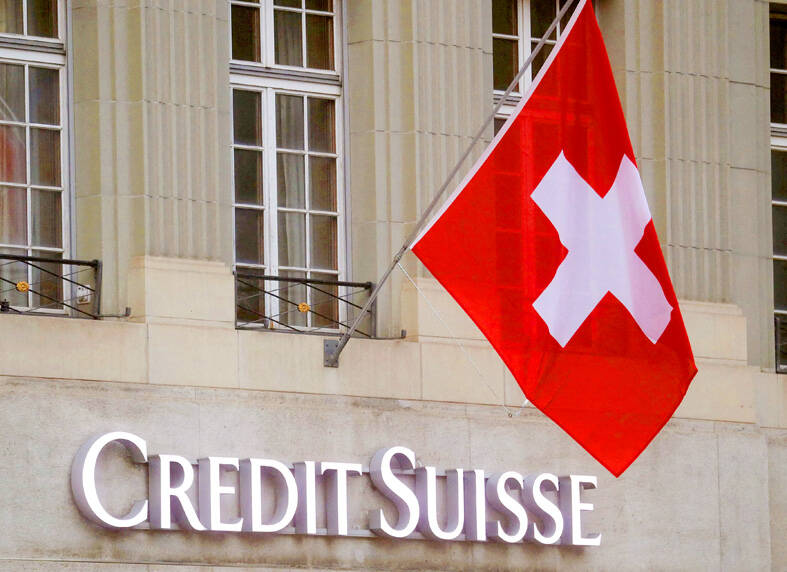Credit Suisse Group AG is planning to cut more than 10 percent of its European investment bankers this year, adding to hundreds of job losses in London and Zurich, the Financial Times newspaper reported, citing people with knowledge of the plans.
The Swiss lender has been reducing headcount across its divisions after announcing plans to reduce 9,000 roles globally by 2025 last year. The further cuts come after the crisis-hit bank gears up to announce its second consecutive annual loss next month.
A wave of job cuts have hit the investment banking world with a recession looming and after revenues plummeted. Goldman Sachs Group Inc, Morgan Stanley, Credit Suisse and Barclays PLC have all either fired staff or announced they plan to do so in the coming months.

Photo: REUTERS
UBS Group AG does not plan acquisitions in the US “in the foreseeable future,” and has no intention to buy Credit Suisse, UBS chairman Colm Kelleher told Swiss newspaper Neue Zuercher Zeitung.
UBS has not yet realized its full potential in the US, Kelleher said in an interview published on Saturday.
“We need to get our wealth management business up and running and improve our margins there,” he said.
The Swiss lender’s US strategy has been in flux since former UBS Americas president Tom Naratil retired, leaving Iqbal Khan as the sole head of the global wealth management business.
The bank also backed away from acquiring robo-adviser Wealthfront, a deal that was meant to widen its reach to the lower rungs of the wealthy. Instead, UBS has retrenched, saying it would focus on its traditional very high net worth customer base.
The bank plans to offer more traditional banking services to its wealthy US clients, such as mortgages and loans.
Kelleher said he sees “low-hanging fruit” in boosting profitability in the US.
“We will not expand the investment bank,” he said, adding that the unit can build on good equities trading, but needs to improve its advisory business.
UBS is seeking more US institutional investors to buy the bank’s shares, Kelleher said.
To this end, the bank wants to get US analysts “to take a closer look at us,” and is considering reporting the performance of its US businesses separately, including profit levels and assets under management.
There is no reason for UBS to trade at a discount compared with US banks such as Morgan Stanley, Kelleher said.
“I would never have accepted the position of chairman if I didn’t believe that a higher valuation could be achieved and that this was a realistic goal,” he said.
The chairman, alongside UBS chief executive officer Ralph Hamers, has been spending more time with institutional investors in the US, but Kelleher said the bank’s messaging about its goals and strategy could be more “straightforward.”
In China, UBS expects a boost in its China business in the second half of the year, as the country moves away from its “zero COVID-19” policy and reopens the economy, Kelleher said.

DIVIDED VIEWS: Although the Fed agreed on holding rates steady, some officials see no rate cuts for this year, while 10 policymakers foresee two or more cuts There are a lot of unknowns about the outlook for the economy and interest rates, but US Federal Reserve Chair Jerome Powell signaled at least one thing seems certain: Higher prices are coming. Fed policymakers voted unanimously to hold interest rates steady at a range of 4.25 percent to 4.50 percent for a fourth straight meeting on Wednesday, as they await clarity on whether tariffs would leave a one-time or more lasting mark on inflation. Powell said it is still unclear how much of the bill would fall on the shoulders of consumers, but he expects to learn more about tariffs

NOT JUSTIFIED: The bank’s governor said there would only be a rate cut if inflation falls below 1.5% and economic conditions deteriorate, which have not been detected The central bank yesterday kept its key interest rates unchanged for a fifth consecutive quarter, aligning with market expectations, while slightly lowering its inflation outlook amid signs of cooling price pressures. The move came after the US Federal Reserve held rates steady overnight, despite pressure from US President Donald Trump to cut borrowing costs. Central bank board members unanimously voted to maintain the discount rate at 2 percent, the secured loan rate at 2.375 percent and the overnight lending rate at 4.25 percent. “We consider the policy decision appropriate, although it suggests tightening leaning after factoring in slackening inflation and stable GDP growth,”

Greek tourism student Katerina quit within a month of starting work at a five-star hotel in Halkidiki, one of the country’s top destinations, because she said conditions were so dire. Beyond the bad pay, the 22-year-old said that her working and living conditions were “miserable and unacceptable.” Millions holiday in Greece every year, but its vital tourism industry is finding it harder and harder to recruit Greeks to look after them. “I was asked to work in any department of the hotel where there was a need, from service to cleaning,” said Katerina, a tourism and marketing student, who would

i Gasoline and diesel prices at fuel stations are this week to rise NT$0.1 per liter, as tensions in the Middle East pushed crude oil prices higher last week, CPC Corp, Taiwan (台灣中油) and Formosa Petrochemical Corp (台塑石化) said yesterday. International crude oil prices last week rose for the third consecutive week due to an escalating conflict between Israel and Iran, as the market is concerned that the situation in the Middle East might affect crude oil supply, CPC and Formosa said in separate statements. Front-month Brent crude oil futures — the international oil benchmark — rose 3.75 percent to settle at US$77.01